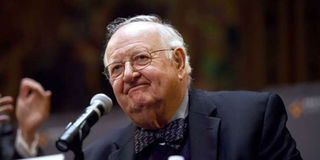Poverty expert wins prize at end of Nobel season

US-British microeconomist Angus Deaton reacts to applause as he attends a press conference after winning the Nobel Economics Prize at Princeton University in Princeton, New Jersey, on October 12, 2015. His research has shown how the clever use of household data can shed light on issues such as the relationship between income and calorie intake. PHOTO | JEWEL SAMAD | AFP
What you need to know:
- Dr Deaton, 69, is a professor at Princeton University in the United States and described winning the prize as a little like being struck by lightning.
- His research has shown how the clever use of household data can shed light on issues such as the relationship between income and calorie intake — increased income does indeed lead to more calories being consumed.
STOCKHOLM
US-British economist Angus Deaton won the Nobel Economics Prize on Monday for ground-breaking work using household surveys to show how consumers, particularly the poor, decide what to buy and how policymakers can help them.
“By emphasising the links between individual consumption decisions and outcomes for the whole economy, his work has helped transform modern microeconomics, macroeconomics and development economics,” the Royal Swedish Academy of Sciences said.
“To design economic policy that promotes welfare and reduces poverty, we must first understand individual consumption choices. More than anyone else, Angus Deaton has enhanced this understanding,” it said.
Dr Deaton, 69, is a professor at Princeton University in the United States and described winning the prize as a little like being struck by lightning.
“If you’re my age and you’ve been working for a long time you know this is a possibility,” he said on Princeton’s website.
“But you also know there are a huge number of people out there who deserve this. That lightning would strike me seemed like a very small probability event. It was sort of like, ‘Oh my goodness, it’s really happening’.”
USE OF DATA
Dr Deaton was honoured for three related achievements: developing with his colleague John Muellbauer around 1980 a system for estimating the demand for different goods; studies of the link between consumption and income that he conducted around 1990; and work he carried out in later decades on measuring living standards and poverty in developing countries with the help of household surveys.
He truly, deeply understands the implications of economic growth, the benefits of modernity, and political economy,” Dr Tyler Cowen, an economics professor at George Mason University in Washington, said on his blog.
His research has shown how the clever use of household data can shed light on issues such as the relationship between income and calorie intake — increased income does indeed lead to more calories being consumed.
It also showed the extent of gender discrimination within the family — girls are discriminated against when households have to tighten the belt.





